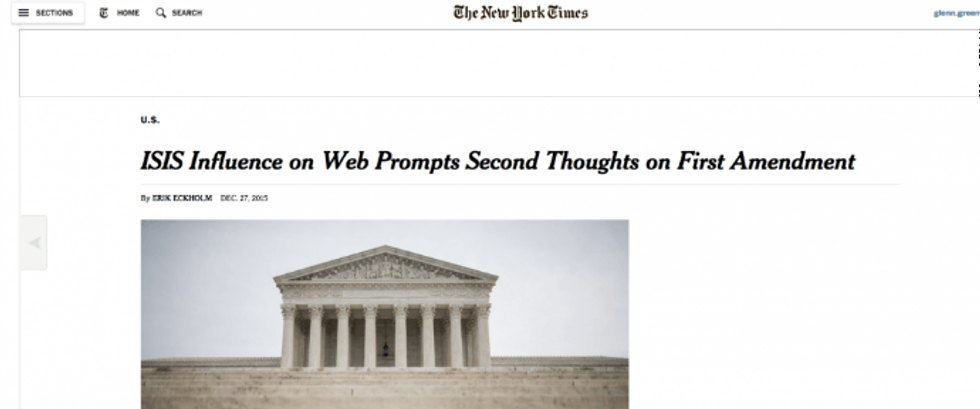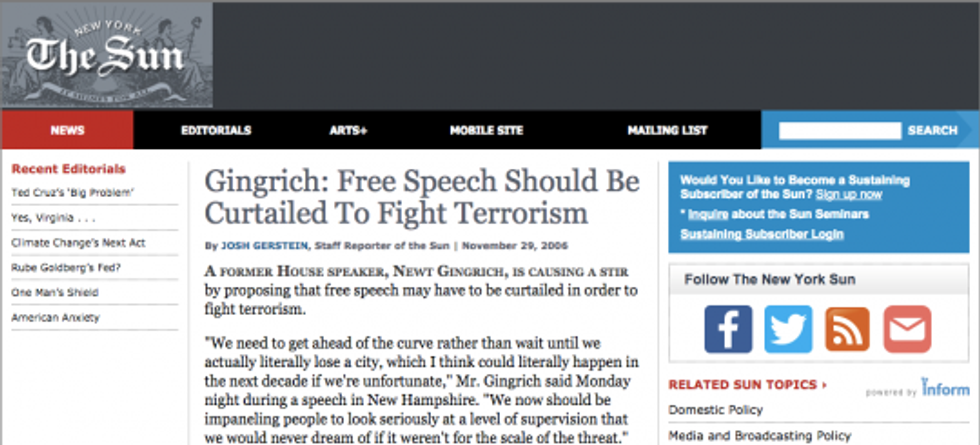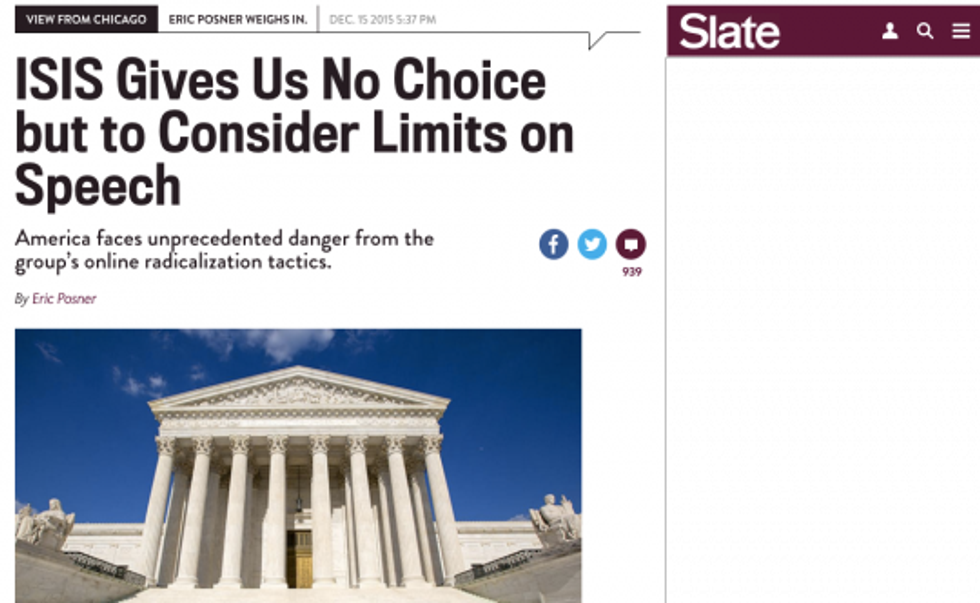Those Demanding Free Speech Limits to Fight ISIS Pose a Greater Threat to U.S. Than ISIS
In 2006 - years before ISIS replaced Al Qaeda as the New and Unprecedentedly Evil Villain - Newt Gingrich gave a speech in New Hampshire in which, as he put it afterward, he "called for a serious debate about the First Amendment and how terrorists are abusing our rights-using them as they once used passenger jets-to threaten and kill Americans." In that speech, Gingrich argued:
In 2006 - years before ISIS replaced Al Qaeda as the New and Unprecedentedly Evil Villain - Newt Gingrich gave a speech in New Hampshire in which, as he put it afterward, he "called for a serious debate about the First Amendment and how terrorists are abusing our rights-using them as they once used passenger jets-to threaten and kill Americans." In that speech, Gingrich argued:
Either before we lose a city, or, if we are truly stupid, after we lose a city, we will adopt rules of engagement that use every technology we can find to break up (terrorists') capacity to use the Internet, to break up their capacity to use free speech [protections] and to go after people who want to kill us-to stop them from recruiting people before they get to reach out and convince young people to destroy their lives while destroying us.
In a follow-up article entitled "The First Amendment is Not a Suicide Pact," Gingrich went even further, arguing that terrorists should be "subject to a totally different set of rules," and called for an international convention to decide "on what activities will not be protected by free speech claims."
To make his case, Gingrich cited a 2005 Commentary article by the extremist former prosecutor Andrew McCarthy, entitled "Free Speech for Terrorists?," the central premise of which was that "the free-speech clause was never intended to frustrate government's ability to suppress true threats to national security." In general, McCarthy argued, we must say that "some things are truly evil," and "that advocating them not only fails to serve any socially desirable purpose but guarantees more evil." Thus, the U.S. Government must "convey in the strongest terms that the advocacy of terrorism in this day and age is entitled to no First Amendment protection."
Back then - just nine years ago - Gingrich's anti-free-speech remarks were, for the most part, quickly dismissed as unworthy of serious debate. Even National Review, which employs McCarthy, included Gingrich's anti-free speech proposal on its 2011 list of the bad ideas the former speaker has espoused in his career. In 2006, I argued that the Gingrich/McCarthy desire to alter the First Amendment to fight The Terrorists was extremist even when judged by the increasingly radical standards of the Bush/Cheney War on Terror, which by that point had already imprisoned Americans arrested on U.S. soil with no due process and no access to lawyers. With rare exception, Gingrich's desire to abridge Free Speech rights in the name of fighting terrorism was dismissed as a fringe idea.
Fast forward to 2015, where the aging Al Qaeda brand has become decisively less scary and ISIS has been unveiled as the new never-before-seen menace. There are now once again calls for restrictions on the First Amendment's free speech protections, but they come not from far-right radicals in universally discredited neocon journals, but rather from the most mainstream voices, as highlighted this week by The New York Times.

The NYT article notes that "in response to the Islamic State's success in grooming jihadists over the Internet, some legal scholars are asking whether it is time to reconsider" the long-standing "constitutional line" that "freedom of speech may not be curbed unless it poses a 'clear and present danger' -- an actual, imminent threat, not the mere advocacy of harmful acts or ideas."
The NYT cites two recent articles, one in Bloomberg by long-time Obama adviser Cass Sunstein and the other in Slate by Law Professor Eric Posner, that suggested limitations on the First Amendment in order to fight ISIS. It describes growing calls to ban the YouTube lectures and sermons of Anwar al-Awlaki, the American cleric whom the U.S. assassinated by drone in 2011 (and then, two weeks later, killed his 16-year-old American son). It also notes that the desire to restrict the internet as a means of fighting ISIS has seeped into the leadership of both parties: Donald Trump said the "internet should be closed up" to ISIS, while "Hillary Clinton said the government should work with host companies to shut jihadist websites and chat rooms," a plan that would be unconstitutional "if the government exerted pressure on private firms to cooperate in censorship."
All of these proposals take direct aim at a core constitutional principle that for decades has defined the First Amendment's free speech protections.
Read the rest of the column at The Intercept.
An Urgent Message From Our Co-Founder
Dear Common Dreams reader, The U.S. is on a fast track to authoritarianism like nothing I've ever seen. Meanwhile, corporate news outlets are utterly capitulating to Trump, twisting their coverage to avoid drawing his ire while lining up to stuff cash in his pockets. That's why I believe that Common Dreams is doing the best and most consequential reporting that we've ever done. Our small but mighty team is a progressive reporting powerhouse, covering the news every day that the corporate media never will. Our mission has always been simple: To inform. To inspire. And to ignite change for the common good. Now here's the key piece that I want all our readers to understand: None of this would be possible without your financial support. That's not just some fundraising cliche. It's the absolute and literal truth. We don't accept corporate advertising and never will. We don't have a paywall because we don't think people should be blocked from critical news based on their ability to pay. Everything we do is funded by the donations of readers like you. Will you donate now to help power the nonprofit, independent reporting of Common Dreams? Thank you for being a vital member of our community. Together, we can keep independent journalism alive when it’s needed most. - Craig Brown, Co-founder |
In 2006 - years before ISIS replaced Al Qaeda as the New and Unprecedentedly Evil Villain - Newt Gingrich gave a speech in New Hampshire in which, as he put it afterward, he "called for a serious debate about the First Amendment and how terrorists are abusing our rights-using them as they once used passenger jets-to threaten and kill Americans." In that speech, Gingrich argued:
Either before we lose a city, or, if we are truly stupid, after we lose a city, we will adopt rules of engagement that use every technology we can find to break up (terrorists') capacity to use the Internet, to break up their capacity to use free speech [protections] and to go after people who want to kill us-to stop them from recruiting people before they get to reach out and convince young people to destroy their lives while destroying us.
In a follow-up article entitled "The First Amendment is Not a Suicide Pact," Gingrich went even further, arguing that terrorists should be "subject to a totally different set of rules," and called for an international convention to decide "on what activities will not be protected by free speech claims."
To make his case, Gingrich cited a 2005 Commentary article by the extremist former prosecutor Andrew McCarthy, entitled "Free Speech for Terrorists?," the central premise of which was that "the free-speech clause was never intended to frustrate government's ability to suppress true threats to national security." In general, McCarthy argued, we must say that "some things are truly evil," and "that advocating them not only fails to serve any socially desirable purpose but guarantees more evil." Thus, the U.S. Government must "convey in the strongest terms that the advocacy of terrorism in this day and age is entitled to no First Amendment protection."
Back then - just nine years ago - Gingrich's anti-free-speech remarks were, for the most part, quickly dismissed as unworthy of serious debate. Even National Review, which employs McCarthy, included Gingrich's anti-free speech proposal on its 2011 list of the bad ideas the former speaker has espoused in his career. In 2006, I argued that the Gingrich/McCarthy desire to alter the First Amendment to fight The Terrorists was extremist even when judged by the increasingly radical standards of the Bush/Cheney War on Terror, which by that point had already imprisoned Americans arrested on U.S. soil with no due process and no access to lawyers. With rare exception, Gingrich's desire to abridge Free Speech rights in the name of fighting terrorism was dismissed as a fringe idea.
Fast forward to 2015, where the aging Al Qaeda brand has become decisively less scary and ISIS has been unveiled as the new never-before-seen menace. There are now once again calls for restrictions on the First Amendment's free speech protections, but they come not from far-right radicals in universally discredited neocon journals, but rather from the most mainstream voices, as highlighted this week by The New York Times.

The NYT article notes that "in response to the Islamic State's success in grooming jihadists over the Internet, some legal scholars are asking whether it is time to reconsider" the long-standing "constitutional line" that "freedom of speech may not be curbed unless it poses a 'clear and present danger' -- an actual, imminent threat, not the mere advocacy of harmful acts or ideas."
The NYT cites two recent articles, one in Bloomberg by long-time Obama adviser Cass Sunstein and the other in Slate by Law Professor Eric Posner, that suggested limitations on the First Amendment in order to fight ISIS. It describes growing calls to ban the YouTube lectures and sermons of Anwar al-Awlaki, the American cleric whom the U.S. assassinated by drone in 2011 (and then, two weeks later, killed his 16-year-old American son). It also notes that the desire to restrict the internet as a means of fighting ISIS has seeped into the leadership of both parties: Donald Trump said the "internet should be closed up" to ISIS, while "Hillary Clinton said the government should work with host companies to shut jihadist websites and chat rooms," a plan that would be unconstitutional "if the government exerted pressure on private firms to cooperate in censorship."
All of these proposals take direct aim at a core constitutional principle that for decades has defined the First Amendment's free speech protections.
Read the rest of the column at The Intercept.
In 2006 - years before ISIS replaced Al Qaeda as the New and Unprecedentedly Evil Villain - Newt Gingrich gave a speech in New Hampshire in which, as he put it afterward, he "called for a serious debate about the First Amendment and how terrorists are abusing our rights-using them as they once used passenger jets-to threaten and kill Americans." In that speech, Gingrich argued:
Either before we lose a city, or, if we are truly stupid, after we lose a city, we will adopt rules of engagement that use every technology we can find to break up (terrorists') capacity to use the Internet, to break up their capacity to use free speech [protections] and to go after people who want to kill us-to stop them from recruiting people before they get to reach out and convince young people to destroy their lives while destroying us.
In a follow-up article entitled "The First Amendment is Not a Suicide Pact," Gingrich went even further, arguing that terrorists should be "subject to a totally different set of rules," and called for an international convention to decide "on what activities will not be protected by free speech claims."
To make his case, Gingrich cited a 2005 Commentary article by the extremist former prosecutor Andrew McCarthy, entitled "Free Speech for Terrorists?," the central premise of which was that "the free-speech clause was never intended to frustrate government's ability to suppress true threats to national security." In general, McCarthy argued, we must say that "some things are truly evil," and "that advocating them not only fails to serve any socially desirable purpose but guarantees more evil." Thus, the U.S. Government must "convey in the strongest terms that the advocacy of terrorism in this day and age is entitled to no First Amendment protection."
Back then - just nine years ago - Gingrich's anti-free-speech remarks were, for the most part, quickly dismissed as unworthy of serious debate. Even National Review, which employs McCarthy, included Gingrich's anti-free speech proposal on its 2011 list of the bad ideas the former speaker has espoused in his career. In 2006, I argued that the Gingrich/McCarthy desire to alter the First Amendment to fight The Terrorists was extremist even when judged by the increasingly radical standards of the Bush/Cheney War on Terror, which by that point had already imprisoned Americans arrested on U.S. soil with no due process and no access to lawyers. With rare exception, Gingrich's desire to abridge Free Speech rights in the name of fighting terrorism was dismissed as a fringe idea.
Fast forward to 2015, where the aging Al Qaeda brand has become decisively less scary and ISIS has been unveiled as the new never-before-seen menace. There are now once again calls for restrictions on the First Amendment's free speech protections, but they come not from far-right radicals in universally discredited neocon journals, but rather from the most mainstream voices, as highlighted this week by The New York Times.

The NYT article notes that "in response to the Islamic State's success in grooming jihadists over the Internet, some legal scholars are asking whether it is time to reconsider" the long-standing "constitutional line" that "freedom of speech may not be curbed unless it poses a 'clear and present danger' -- an actual, imminent threat, not the mere advocacy of harmful acts or ideas."
The NYT cites two recent articles, one in Bloomberg by long-time Obama adviser Cass Sunstein and the other in Slate by Law Professor Eric Posner, that suggested limitations on the First Amendment in order to fight ISIS. It describes growing calls to ban the YouTube lectures and sermons of Anwar al-Awlaki, the American cleric whom the U.S. assassinated by drone in 2011 (and then, two weeks later, killed his 16-year-old American son). It also notes that the desire to restrict the internet as a means of fighting ISIS has seeped into the leadership of both parties: Donald Trump said the "internet should be closed up" to ISIS, while "Hillary Clinton said the government should work with host companies to shut jihadist websites and chat rooms," a plan that would be unconstitutional "if the government exerted pressure on private firms to cooperate in censorship."
All of these proposals take direct aim at a core constitutional principle that for decades has defined the First Amendment's free speech protections.
Read the rest of the column at The Intercept.




